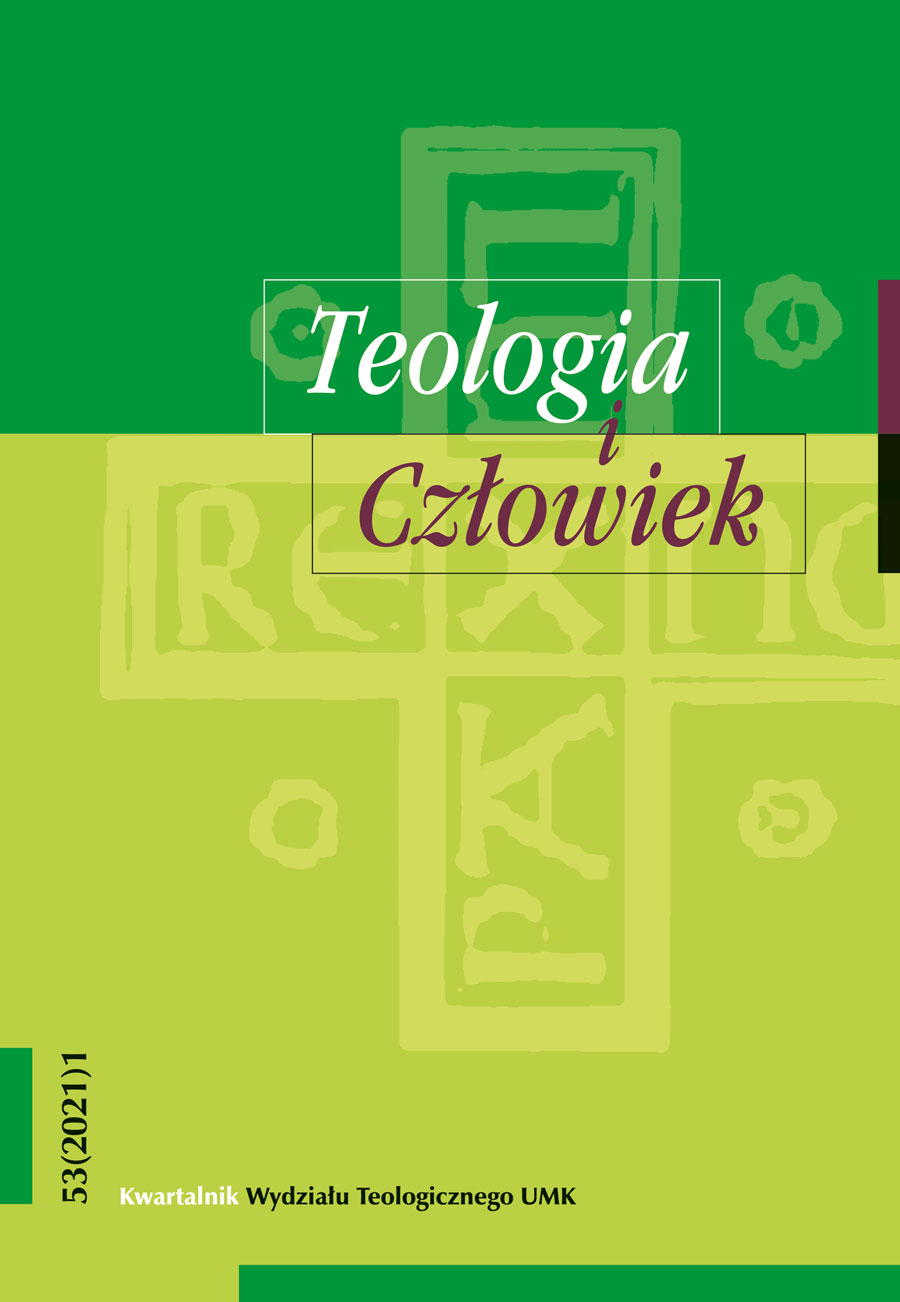Moral Evaluation of Using Certain Types of CO VID-19 Vaccines in the Light of Christian Personalism
DOI:
https://doi.org/10.12775/TiCz.2021.001Keywords
cell lines, vaccines, SARS-CoV-2, COVID-19, pandemic, personalismAbstract
This article offers a moral evaluation of the use of COVID-19 vaccines obtained from human cell lines that originate from aborted human foetuses. The criterion of this evaluation is the personalistic norm which states that an act is morally good if it contributes to the affirmation of a person for that person alone. The paper begins with a brief explanation of what foetal cell lines are and what technology is used in the production of vaccines that use such cell lines. Then, it indicates which of the currently available COVID-19 vaccines are produced using foetal cell lines. Finally, it examines the objections that are being raised against the technology in question.
References
Austriaco N. P. G., Moral Guidance on Using COVID-19 Vaccines Developed with Human Fetal Cell Lines, https://www.thepublicdiscourse.com/2020/05/63752/ (dostęp 06.02.2021).
Bednarski F. W., „Osobie jako osobie należna jest od osoby jako osoby afirmacja”, „Roczniki Filozoficzne” 29/2 (1981), s. 112–117.
Borkowski L., Drąg M., Fal A. M. i in. Szczepienia przeciw COVID-19. Innowacyjne technologie i efektywność, Warszawa 2020.
Charakterystyka produktu leczniczego COVID-19 Vaccine AstraZeneca zawiesina do wstrzykiwań. Szczepionka przeciw COVID-19 (ChAdOx1-S [rekombinowana]), https://ec.europa.eu/health/documents/community-register/2021/20210129150842/anx_150842_pl.pdf (dostęp 06.02.2021).
Dec I., Personalizm, w: Powszechna Encyklopedia Filozofii, t. 8, PTTA, Lublin 2007, s.122–127.
Dicks M. D. J., Spencer A. J., Edward N. i in. A novel chimpanzee adenovirus vector with low human seroprevalence: improved systems for vector derivation and comparative immunogenicity, „PLoS One”, 7 (2012), https://journals.plos.org/plosone/article?id=10.1371/journal.pone.0040385 (dostęp 06.02.2021).
European Centre for Disease Prevention and Control, Novel coronavirus disease 2019 (COVID-19) pandemic: increased transmission in the EU/EEA and the UK – sixth update (12 march 2020), https://www.ecdc.europa.eu/sites/default/files/documents/RRA-sixth-update-Outbreak-of-novel-coronavirus-disease-2019-COVID-19.pdf (dostęp 29.01.2021).
Garvey J., Commentary: What the HEK?, https://www.catholicnews.com/commentary-what-the-hek/ (dostęp 10.02.2021).
Jak się bada bezpieczeństwo szczepionek?, https://szczepienia.pzh.gov.pl/wszystko-o-szczepieniach/jak-sie-bada-bezpieczenstwo-szczepionek/?strona=6#czy-w-produkcji-szczepionek-dostepnych-w-polsce-wykorzystywany-jest-material-pochodzacy-od-czlowieka (dostęp 09.02.2021).
Kilarski W., Strukturalne podstawy biologii komórki, PWN, Warszawa 2007.
Kongregacja Nauki Wiary, Dignitas Personae, http://www.vatican.va/roman_curia/congregations/cfaith/documents/rc_con_cfaith_doc_20081208_dignitas-personae_pl.html (dostęp 10.02.2021).
Leiva R., A Brief History of Human Diploid Cell Strains, „The National Catholic Bioethics Quarterly” 6 (2006), s. 443–452.
Lundstrom R., Plotkin S. i in. Gamma Globulin Prophylaxis; Inactivated Rubella Virus; Production and Biologics Control of Live Attenuated Rubella Virus Vaccines. Discussion on Session V, „American Journal of Diseases of Children 118 (1969), s. 372–381.
Maritain J., La personne et le bien commun, Paris 1947.
Orłowski T., Szczepionki produkowane na liniach komórkowych pochodzenia płodowego – problemy etyczne, „Studia Redemptorystowskie” 9–1 (2011), s. 75–90.
Stasiak P., Sznitowska M., Zastosowanie hodowli komórkowych w badaniach biofarmaceutycznych, „Farmacja Polska” 66/3 (2010), s. 228–234.
Papieska Akademia Życia, Rozważania moralne o szczepionkach przygotowanych na bazie komórek pochodzących z abortowanych płodów ludzkich, https://www.corvelva.it/pl/approfondimenti/notizie/riflessioni-morali-circa-i-vaccini-preparati-a-partire-da-cellule-provenienti-da-feti-umani-abortiti.html (dostęp 10.02.2021).
Pontificia Accademia per la Vita, Nota circa l’uso dei vaccini, http://www.academyforlife.va/content/pav/it/the-academy/activity-academy/note-vaccini.html (dostęp 15.02.2021).
Pardi N., Hogan M., Porter F. i in., mRNA vaccines – a new era in vaccinology, „Nature Reviews. Drug Discovery”, 17 (2018), s. 261–279.
Stanowisko Zespołu Ekspertów ds. Bioetycznych Konferencji Episkopatu Polski dotyczące szczepionek, https://episkopat.pl/zespol-ekspertow-ds-bioetycznych-kep-ws-szczepionek-przeciwko-covid-19/ (dostęp 10.02.2021).
Stokłosowa S. (red.), Hodowla komórek i tkanek, PWN, Warszawa 2006.
Styczeń T., Etyka czy etyki?, „Roczniki Filozoficzne” 29/2 (1981), s. 90–111.
Szczepionki nieetyczne i alternatywne, http://dobreszczepionki.pl/?page_id=2595 (dostęp 03.02.2021).
Szostek A., Wokół afirmacji osoby. Próby uściśleń inspirowane dyskusją nad koncepcją etyki ks. Tadeusza Stycznia, „Roczniki Filozoficzne” 32/2 (1984), s. 149-166.
Wadman M., Medical research: cell division, „Nature” 498 (2013), s. 422–426.
Wojtyła K., Osoba i czyn, Kraków 1969.
Wójtowicz A., Linie komórkowe, w: S. Stokłosowa (red.), Hodowla komórek i tkanek, PWN, Warszawa 2006, s. 140–156.
Zespół Ekspertów ds. Bioetycznych Konferencji Episkopatu Polski, Stanowisko Zespołu Ekspertów ds. Bioetycznych Konferencji Episkopatu Polski dotyczące szczepionek, 17.
Downloads
Published
How to Cite
Issue
Section
License
Copyright (c) 2021 Theology and Man

This work is licensed under a Creative Commons Attribution-NoDerivatives 4.0 International License.
CC BY ND 4.0. The Creator/Contributor is the Licensor, who grants the Licensee a non-exclusive license to use the Work on the fields indicated in the License Agreement.
- The Licensor grants the Licensee a non-exclusive license to use the Work/related rights item specified in § 1 within the following fields: a) recording of Work/related rights item; b) reproduction (multiplication) of Work/related rights item in print and digital technology (e-book, audiobook); c) placing the copies of the multiplied Work/related rights item on the market; d) entering the Work/related rights item to computer memory; e) distribution of the work in electronic version in the open access form on the basis of Creative Commons license (CC BY-ND 3.0) via the digital platform of the Nicolaus Copernicus University Press and file repository of the Nicolaus Copernicus University.
- Usage of the recorded Work by the Licensee within the above fields is not restricted by time, numbers or territory.
- The Licensor grants the license for the Work/related rights item to the Licensee free of charge and for an unspecified period of time.
FULL TEXT License Agreement
Stats
Number of views and downloads: 4302
Number of citations: 0



